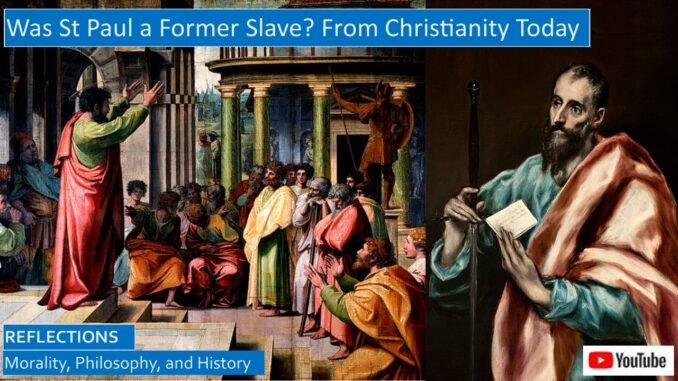
Was St Paul a Former Slave? Were his parents enslaved by the Romans?
Were slaves the employees of the ancient world?
How did slavery in the ancient world differ from slavery in the Deep South before the Civil War?
Could employees be paid so little that they are wage slaves?
YouTube video for this reflection: https://youtu.be/KJOBoAGPGVI
WAS ST PAUL AND/OR HIS PARENTS FORMER SLAVES?
The May/June 2024 issue of Christianity Today has a persuasive article, Paul Unchained, that argues that either St Paul or his parents were slaves, though St Paul was definitely both a free man and a Roman citizen when he was called to be an apostle.
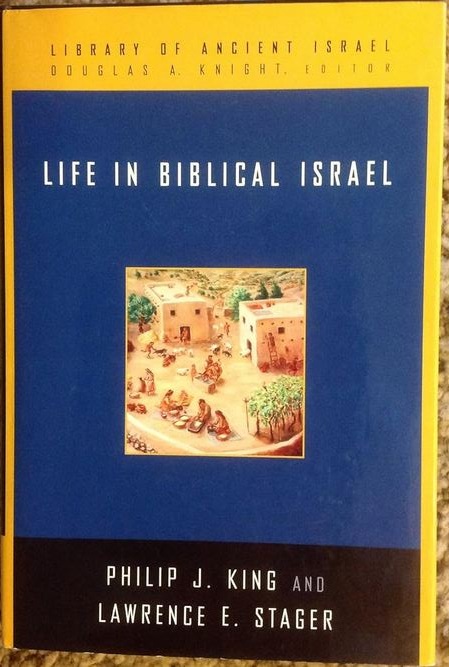
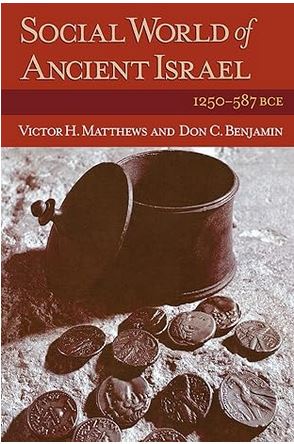
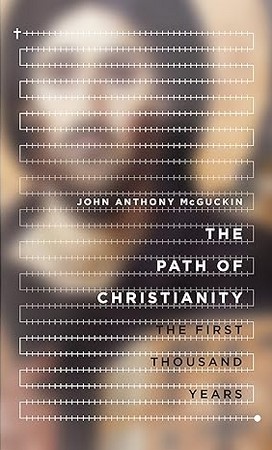
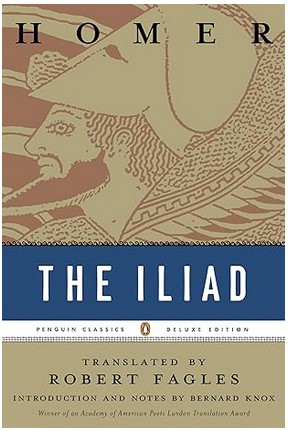

When we think of slaves, we immediately think of the torments blacks faced as slaves before the Civil War. But ancient slaves were very different from slaves in the antebellum South, the ancient slavery system was not raced-based slavery, where slaves were thought to be subhuman, and it was more common for ancient slaves to either purchase or be granted their freedom, particularly in Rome, where slaves were more numerous.
Our authors in Christianity Today note that “many Bible translations have chosen to use the term servant or bondservant rather than slave,” recognizing that ancient slavery was neither as brutal nor was it race-based as was pre-Civil War slavery in the Confederacy.
SLAVERY IN ANCIENT GREECE AND ROME
What were the main sources of slaves in the ancient world? Many were born into slavery, and many were captured by pirates or brigands and sold into slavery. Many slaves were captured in war, as most ancient cultures were warrior cultures out of necessity. If the forces of a city-state lost a battle to a hostile enemy, often all property would be pillaged, the military-aged men would be slaughtered, and the women and children would be enslaved.
Ancient Warrior Societies, Blog 1, The Warrior Ethos of Ancient Greece, Rome, and Israel
https://seekingvirtueandwisdom.com/ancient-warrior-societies-blog-1-the-warrior-ethos-of-ancient-greece/
Ancient Warrior Culture, Concubines, and Slaves, Ancient Greece, Rome, and Israel
https://youtu.be/7QAZ_s6zw4E
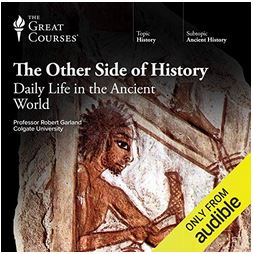
In contrast, the Roman armies typically enslaved the men also, rather than slaying them, although sometimes barbarian soldiers would be recruited to serve in a province far from home. The slaves who toiled in mines or on vast plantations often did not live long and had little hope of freedom. But city and household slaves were often freed after many years of service. If they became tradesmen, they could purchase their freedom from wages they earned. In the early days of the Roman Empire, vast numbers of slaves were captured in their conquests. The Romans knew that if slaves thought that their slavery was not permanent, they would be less likely to revolt.
Slaves in the Ancient World, Blog 1, Were Slaves the Employees of the Ancient World?
http://www.seekingvirtueandwisdom.com/slaves-in-the-ancient-world-blog-1-were-slaves-the-employees-of-the-ancient-world/
Slaves in Ancient Greece and Rome, Blog 2
http://www.seekingvirtueandwisdom.com/slaves-in-ancient-greece-and-rome-blog-2/
https://youtu.be/O67cmVRvBtA
Quite often the question is asked: Why didn’t St Paul seek to abolish slavery?
Our author answers: “The first Christians had their minds almost exclusively fixed on the Second Coming, which they believed was imminent. There wasn’t time to reform entrenched Roman injustices.”[1]
Although this is the common answer, it ignores the fact that no one in the ancient world had any inclination to abolish slavery. Slaves were the employees of the ancient world. James Boice, in his commentary on Ephesians, makes this point, observing that workers can also be abused as slaves were in the ancient world. When a full-time worker cannot earn enough to feed, clothe, and house his family with dignity, then he is a wage slave. In fact, Boice suggests that when interpreting Ephesians, you should replace the word SLAVE with EMPLOYEE:[2]
St Paul, Ephesians 6: “Slaves (employees), be obedient to those who are your earthly masters (employers), with fear and trembling, in singleness of heart, as to Christ; not in the way of eye-service, as men-pleasers, but as servants of Christ, doing the will of God from the heart, rendering service with a good will as to the Lord and not to men, knowing that whatever good any one does, he will receive the same again from the Lord, whether he is a slave or free.”
The only practical difference between a slave and an employee is the employee can choose his master. Masters, and employers, likewise have a duty to be respectful towards their employees.
St Paul, Ephesians 6, continued: “Masters (employers), do the same to them, and forbear threatening, knowing that he who is both their Master and yours in heaven, and that there is no partiality with him.”[3]
Why Doesn’t the Bible Condemn Slavery? Perspectives from Jewish, Christian, and Stoic Traditions
https://seekingvirtueandwisdom.com/why-doesnt-the-bible-condemn-slavery/
https://youtu.be/Tz8EVYLuYoc
The trend among the Old Testament prophets, the New Testament Christians, and the Stoic Philosophers, was to continually improve the conditions of slaves, granting them greater respect and dignity, and improving their welfare.
Teachings about Slavery in the Bible, the Stoics, and by the Early Church Fathers
http://www.seekingvirtueandwisdom.com/teachings-about-slavery-in-the-bible-and-by-the-early-church-fathers/
https://youtu.be/poyvJajCXnE
WERE SOME ANCIENT SLAVES WELL EDUCATED?
Another difference is that many ancient slaves were well educated. In contrast, slave owners in the Deep South before the Civil War did not teach their slaves how to read, worried they would then read abolitionist literature. In fact, the Southern states made it illegal to teach a slave how to read after rebellious slaves murdered many white slave owners in the 1831 Nat Turner slave rebellion.[4]
We have several examples from both ancient Rome and Greece. The leading Roman Stoic Philosopher Epictetus was a former slave of a former slave. He likely attended the philosophy classes of Musonius Rufus while he was still a slave, he constantly cites Rufus in his lectures. Epictetus emphasized that you can be free in your soul even when serving under brutal servitude.[5]
Epictetus, Stoic Philosopher
http://www.seekingvirtueandwisdom.com/epictetus-discourses-blog-1/
http://www.seekingvirtueandwisdom.com/epictetus-discourses-blog-2/
https://youtu.be/Dhd543kov-E
The Greek Cynic Philosopher Diogenes of Sinope, a predecessor to the Greek stoics, was captured by pirates and sold into slavery in Corinth. He was purchased by a citizen who employed him as a tutor for this two young sons, he taught them to live their lives as Cynic philosophers. He declined offers from his friends in Athens to purchase his freedom. He was considered part of the family and was buried in the family plot.[6] This was common in the ancient Greek culture, often the household slaves were formerly considered part of the oikos, or family.[7]
Greek Cynic Philosophers, Inspiring Greek Stoics
http://www.seekingvirtueandwisdom.com/diogenes-and-the-greek-cynic-philosophers/
https://youtu.be/zAAal5p8AX8
After Rome conquered Greece, many Roman families eagerly purchased educated Greek slaves to serve as tutors for their children.
WERE PAUL’S PARENTS ENSLAVED BY THE ROMANS?
Our authors in Christianity Today note that several prominent Biblical scholars in past 150 years have speculated that Paul’s parents were enslaved, perhaps in “the uprising in 4 BC, when Varus, Roman governor of Syria, burned entire cities and crucified 2,000 people. In Galilean cities like Sepphoris, Josephus wrote in Antiquities of the Jews, ‘troops made its inhabitants slaves.’” Furthermore, in St Jerome’s commentary on Philemon, written around the end of the fourth century, likely using Origen’s commentary as a source, states St Paul’s parents were Gischala in Judea, and were among the Jews exiled to Tarsus by the Romans. A few centuries later, St Photius, the scholarly bishop of Constantinople, confirms this, adding that St Paul was born to enslaved parents in Tarsus. These ancient sources are highly regarded by modern scholars.
Our Christianity Today authors note that “when Paul told the commander in Acts 22:28 that he was born a Roman citizen, that word, gennao, can refer to birth or adoption. Freed Roman slaves were often adopted into their master’s family and given a Roman name and citizenship.” Since St Paul says he was born a free man, his parents were freed from slavery, either by buying their freedom, or through a will, or by a generous master, which was common in Roman society.
Our authors note that in Philemon, “Paul refers to himself in very Jewish terms: ‘a Hebrew of Hebrews,’ Aramaic speaking, of the tribe of Benjamin, a Pharisee, a zealot.” Also, “Paul is obsessed with the language of slavery. In his writings, he speaks constantly of it: Of bondage. Of freedom. Of adoption. Of shackles. Of citizenship. The two most common openings to Paul’s epistles are ‘Paul, an apostle of Christ’ and ‘Paul, a slave of Christ.’”[8]
ST PAUL RETURNING TO PHILEMON HIS SLAVE
Apparently, Onesimus had run away from his master, Philemon, fleeing to St Paul, serving him while he was in prison. St Paul allowed him to stay for a time, instructing him in the faith, but the time came when he would return Onesimus to his master.
Onesimus brought with him this epistle from Paul:
“I appeal to you for my child, Onesimus, whose father I have become in my imprisonment. Formerly he was useless to you, but now he is indeed useful to you and to me. I am sending him back to you, sending my very heart. I would have been glad to keep him with me, in order that he might serve me on your behalf during my imprisonment for the gospel; but I preferred to do nothing without your consent in order that your goodness might not be by compulsion but of your own free will.”
The Christianity Today author observes that St Paul is using the Greek word “splanchna” for heart, a word that “denotes one’s innermost feelings,” rather than the more commonly used Greek word “kardia.” Our author speculates, “Why was Paul so personally involved? He knew what it was like to walk in Onesimus’ sandals.”
St Paul continues his epistle to Philemon: “Perhaps this is why he was parted from you for a while, that you might have him back for ever, no longer as a slave but more than a slave, as a beloved brother, especially to me but how much more to you, both in the flesh and in the Lord. So, if you consider me your partner, receive him as you would receive me. If he has wronged you at all, or owes you anything, charge that to my account. I, Paul, write this with my own hand, I will repay it—to say nothing of your owing me even your own self.”[9]
There was an honored church tradition that Onesimus first became of pastor of pastors, and later served as the bishop of Ephesus after Timothy’s martyrdom, and was himself martyred in his old age.[10]
REFERENCES TO SLAVERY IN OTHER PAULINE EPISTLES
The numerous references to slavery in other Pauline Epistles support the argument that either St Paul and/or his parents were former slaves. For example, St Paul often referred to himself as a slave who belonged to Christ, as in Romans 1:1 and Philippians 1:1. He exhorted Christians not to be slaves to sin, as in Romans 6:15-23. Paul even said that Christ took on the nature of a slave and became poor for our sake in 2 Corinthians 8:9 and Philippians 2:7.
St Paul’s memorable verse is in Galatians 3: “For as many of you as were baptized into Christ have put on Christ. There is neither Jew nor Greek, there is neither slave nor free, there is neither male nor female; for you are all one in Christ Jesus.”
There was another leader in the ancient church, Hermas in the epistle Shepherd of Hermas, who was a former slave of Rhoda, who appears to him in a vision. The Shepherd of Hermas was included in the liturgy of many early Christian churches.
Shepherd of Hermas on Envy, Dangers of Luxury, and Salvation
http://www.seekingvirtueandwisdom.com/shepherd-of-hermas/
https://youtu.be/NFQ3fGocis0
THE PROBLEM OF CONCUBINES
We cannot conclude a discussion of slavery without pointing out an ugly fact of both ancient and modern systems of slavery, and that is the ugly reality that, quite often, young masters sexually abused their female slaves and concubines. In fact, it was often not seen as sexual abuse, since they could do as they wished with their property. The plot of Homer’s Iliad revolves around warriors fighting over captured concubines, and the Torah itself legislates that Jewish warriors should respect the concubines they capture in war as they would respect Jewish wives. This issue does not disappear with the end of chattel slavery, Harvey Weinstein and the Me-Too movement attests to the perennial problem of sexual abuse in the workplace.
Iliad Blog 2, Captured Concubines in the Iliad and the Torah
http://www.seekingvirtueandwisdom.com/iliad_blog02/
The Iliad, blog 4, Briseis, Chryseis, Aren’t all Concubines the Same?
http://www.seekingvirtueandwisdom.com/the-iliad-blog-4-briseis-chryseis-arent-all-concubines-the-same/
Concubines in the Iliad, Old Testament and Christian Tradition
https://youtu.be/bGHHD7XTvr0
We have other reflections on the slave autobiographies of Frederick Douglass, Booker T Washington, and Augustine Tolton, plus essays on the challenges faced by Southern blacks shortly after the Civil War by WEB Dubois.
Frederick Douglass Tells Us About His Life as a Slave in his Autobiography
http://www.seekingvirtueandwisdom.com/frederick-douglass-tells-us-about-his-life-as-a-slave-in-his-autobiography/
https://youtu.be/7VkzhyNnuQk
Up From Slavery: Autobiography of Booker T Washington
http://www.seekingvirtueandwisdom.com/up-from-slavery-autobiography-of-booker-t-washington/
https://youtu.be/yxDnJ6sBoJc
Father Augustine Tolton, From Slave to Priest
http://www.seekingvirtueandwisdom.com/father-augustine-tolton-from-slave-to-priest/
https://youtu.be/dZbzWJkAf5k
WEB Du Bois: The Souls of Black Folk, Personal Essays From Reconstruction Era
http://www.seekingvirtueandwisdom.com/web-dubois-souls-of-black-folk-fighting-for-dignity/
https://youtu.be/x212gx1lNIA
Plus, we have many narratives of slaves fleeing from bondage before the Civil War via the Underground Railroad.
https://www.youtube.com/playlist?list=PLJVlY2bjK8ljanN6e6CSF5BOt14GvAoeY
DISCUSSING THE SOURCES
Our primary source is the article, Paul Unchained, in the May/June 2024 issue of Christianity Today, a magazine that was founded by Billy Graham for church leaders and informed laymen. Another primary source is the lectures on Greek and Roman slaves by the Teaching Company, now Wondrium, plus Homer’s Iliad and Odyssey. Although Homer’s accounts are fictional, and very ancient, they nevertheless provide a valuable window into ancient Greek culture. Plus, Andrew McGuckin’s review of the first thousand years of Christianity has a discussion of ancient slavery. Finally, we have two sources that discuss slavery in ancient Israel.
[1] Mark Fairchild and Jordan Monson, Paul Unchained, in Christianity Today, May/June 2024, p. 45, https://www.christianitytoday.com/ct/2024/may-june/was-paul-saul-tarsus-slave.html
[2] James Boice, Ephesians, An Expositional Commentary, Chapter 35, Slaves and Masters, pp. 218-221.
[3] https://www.biblegateway.com/passage/?search=ephesians+6%3A5-9&version=RSVCE
[4] https://en.wikipedia.org/wiki/Nat_Turner%27s_Rebellion
[5] https://en.wikipedia.org/wiki/Epictetus
[6] https://en.wikipedia.org/wiki/Diogenes
[7] https://en.wikipedia.org/wiki/Oikos
[8] Mark Fairchild and Jordan Monson, Paul Unchained, in Christianity Today, May/June 2024, pp. 36-47, https://www.christianitytoday.com/ct/2024/may-june/was-paul-saul-tarsus-slave.html
[9] https://www.biblegateway.com/passage/?search=philemon+1%3A10-19&version=RSVCE and Christianity Today article.
[10] https://en.wikipedia.org/wiki/Onesimus and Christianity Today article.


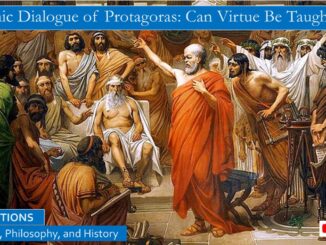
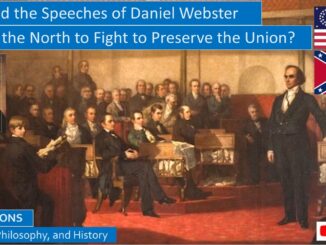
Be the first to comment